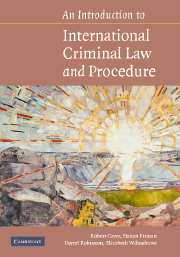Book contents
- Frontmatter
- Contents
- Preface
- Table of Cases
- Table of Treaties
- Table of Abbreviations
- Part A Introduction
- Part B Prosecutions in National Courts
- Part C International Prosecutions
- 6 The History of International Criminal Prosecutions: Nuremberg and Tokyo
- 7 The ad hoc International Criminal Tribunals
- 8 The International Criminal Court
- 9 Other Courts with International Elements
- Part D Substantive Law of International Crimes
- Part E Principles and Procedures of International Prosecutions
- Part F Relationship Between National and International Systems
- Index
- References
7 - The ad hoc International Criminal Tribunals
- Frontmatter
- Contents
- Preface
- Table of Cases
- Table of Treaties
- Table of Abbreviations
- Part A Introduction
- Part B Prosecutions in National Courts
- Part C International Prosecutions
- 6 The History of International Criminal Prosecutions: Nuremberg and Tokyo
- 7 The ad hoc International Criminal Tribunals
- 8 The International Criminal Court
- 9 Other Courts with International Elements
- Part D Substantive Law of International Crimes
- Part E Principles and Procedures of International Prosecutions
- Part F Relationship Between National and International Systems
- Index
- References
Summary
Introduction
Until the early 1990s, it seemed unlikely that the progeny of Nuremberg and Tokyo IMTs would appear soon. However, in response to two conflicts in the 1990s (the Yugoslav wars of dissolution and the Rwandan genocide of 1994) the United Nations revived the idea of international criminal tribunals. This chapter will introduce those tribunals, and explain their practice. Although it is too early to come to any final conclusions about the Tribunals, this chapter will also draw out some of the plaudits and criticisms that have attended the operation of the Tribunals so far. This chapter does not, however, attempt to provide a comprehensive analysis of the jurisprudence of the Tribunals, as their output is analysed elsewhere in this book.
The International Criminal Tribunal for Yugoslavia
The creation of the ICTY
Although some of the roots of the dissolution of Yugoslavia go back to the Second World War if not further, political developments in what was then the Socialist Federal Republic of Yugoslavia in the 1980s led that country to break up through a number of linked armed conflicts starting in 1991. The conflicts were characterized by large-scale violations of international criminal law committed especially against civilians, most notably sexual offences and the practice of ‘ethnic cleansing’. Pictures of concentration camps in Bosnia, which evoked memories of the Holocaust, caused public outcry and led to demands that something be done about the situation.
- Type
- Chapter
- Information
- An Introduction to International Criminal Law and Procedure , pp. 102 - 118Publisher: Cambridge University PressPrint publication year: 2007



